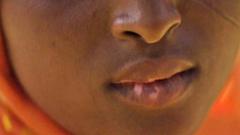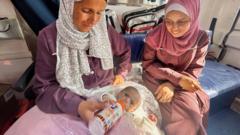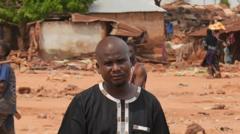In a sobering account from Kano, Nigeria, a mother named Fatima shares her deep regret over using skin-lightening creams on her six children, motivated by societal pressures regarding beauty and skin tone. Fatima, who has experienced devastating consequences due to her choice, illustrates the harmful effects of these widely used products, raising concerns about cultural beauty standards and public health.
**The Harrowing Impact of Skin-Lightening Creams on Nigerian Families**

**The Harrowing Impact of Skin-Lightening Creams on Nigerian Families**
A Nigerian mother reveals the painful consequences of using skin-lightening creams on her children, sparking a wider conversation about beauty standards and health risks.
In Fatima's case, her two-year-old son suffers from severe burns and discolored skin, while her daughters exhibit various skin ailments linked to these creams, such as visible scars and an unfavorable change in pigmentation. Her initial motivation came from familial comparisons that favored light-skinned relatives, which not only caused her distress but also affected how her children were perceived within their community.
Statistics reveal that Nigeria has the highest prevalence of skin-whitening product usage in Africa, with 77% of women reportedly using these creams regularly. Although the products are often available without prescriptions, they frequently contain dangerous ingredients, including corticosteroids and mercury, which can lead to serious health issues, including dermatitis and kidney damage.
Fatima's account reflects a broader cultural phenomenon in Nigeria where lighter skin is often equated with beauty and prosperity. Dermatology specialists note that many women feel compelled to shield their children from perceived discrimination by starting skin-bleaching practices from infancy. The social repercussions are stark, with children facing stigma and derision linked to their skin tone.
Amidst alarming health risks, the Nigerian government has stepped up efforts to combat the unregulated market for these products, yet many women remain unaware of the dangers or disregard them in pursuit of societal acceptance. As Fatima aims to educate others on the perils of skin-bleaching creams, she hopes her plight will serve as a cautionary tale, urging parents to reconsider such harmful practices for the sake of their children's health and well-being.
Statistics reveal that Nigeria has the highest prevalence of skin-whitening product usage in Africa, with 77% of women reportedly using these creams regularly. Although the products are often available without prescriptions, they frequently contain dangerous ingredients, including corticosteroids and mercury, which can lead to serious health issues, including dermatitis and kidney damage.
Fatima's account reflects a broader cultural phenomenon in Nigeria where lighter skin is often equated with beauty and prosperity. Dermatology specialists note that many women feel compelled to shield their children from perceived discrimination by starting skin-bleaching practices from infancy. The social repercussions are stark, with children facing stigma and derision linked to their skin tone.
Amidst alarming health risks, the Nigerian government has stepped up efforts to combat the unregulated market for these products, yet many women remain unaware of the dangers or disregard them in pursuit of societal acceptance. As Fatima aims to educate others on the perils of skin-bleaching creams, she hopes her plight will serve as a cautionary tale, urging parents to reconsider such harmful practices for the sake of their children's health and well-being.



















